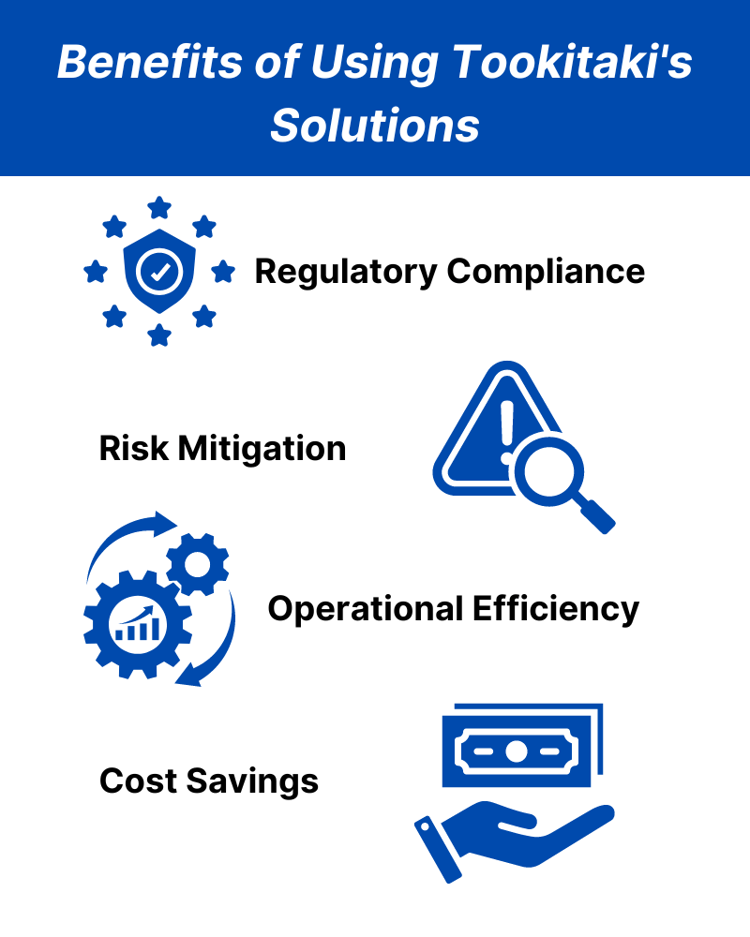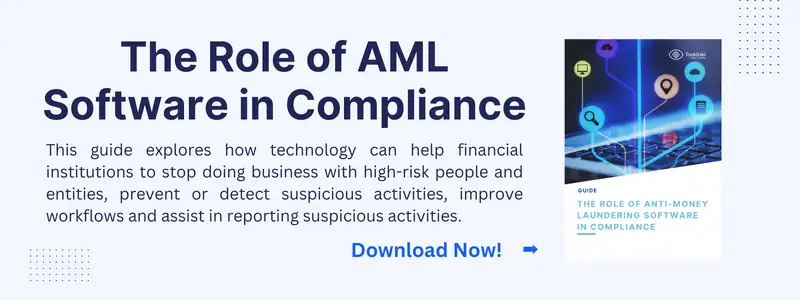The financial industry is heavily regulated in Malaysia, and financial institutions are required to comply with various regulations. Anti-Money Laundering (AML) and Counter Financing of Terrorism (CFT) regulations are among the most important, and financial institutions must comply with these regulations to prevent financial crimes and protect the financial system's integrity. These measures aim to ensure that financial institutions operating within the country follow established guidelines and regulations to prevent money laundering and terrorism financing.
Tookitaki provides AML/CFT solutions that help financial institutions in Malaysia to comply with regulatory requirements and prevent financial crimes. This article will explore how Tookitaki's solutions ensure regulatory compliance in Malaysia.
AML and CFT Regulations in Malaysia
Malaysia's financial sector is a significant contributor to its economy, making it an attractive target for money laundering and other financial crimes. To combat these threats, financial institutions in Malaysia must comply with Anti-Money Laundering (AML) regulations.
The Malaysian government, through the Central Bank of Malaysia and the Securities Commission Malaysia, has established a robust AML regulatory regime. The regime includes laws and regulations related to financial services, such as the Anti-Money Laundering, Anti-Terrorism Financing and Proceeds of Unlawful Activities Act 2001 (AMLA), the Financial Services Act 2013 (FSA), and the Islamic Financial Services Act 2013 (IFSA).
These laws are designed to prevent money laundering, terrorism financing, and other financial crimes in the country. They require financial institutions to implement adequate AML/CFT policies and procedures to prevent money laundering and terrorist financing activities. Failure to comply with these regulations can result in hefty fines and criminal prosecution.
Importance of AML Regulatory Compliance in Malaysia
The importance of AML regulatory compliance in Malaysia cannot be overstated. The country is an emerging financial hub in the Southeast Asian region, and as such, it is vulnerable to various financial crimes, including money laundering and terrorism financing. The Malaysian government recognises this and has implemented measures to prevent these crimes from happening. Financial institutions operating within the country must comply with these measures to maintain their licenses and avoid potential legal consequences.
Challenges Faced by Financial Institutions in Malaysia
Financial institutions in Malaysia face various challenges in complying with AML regulations. One of the biggest challenges is the sheer volume of data they need to monitor, analyse and report. Financial institutions must ensure their AML programs can detect suspicious transactions and activities while minimizing false positives. Additionally, they must ensure their staff is adequately trained to detect and report suspicious activities.
Non-compliance with AML regulations can result in significant risks and consequences. These include reputational damage, financial loss, and regulatory sanctions. Financial institutions may also face legal action and criminal prosecution.
How Tookitaki's Solutions Ensure Regulatory Compliance
Tookitaki is leading the charge in the fight against financial crime with its Anti-Money Laundering Suite and Anti-Financial Crime Ecosystem. Tookitaki's solutions are designed to help financial institutions in Malaysia comply with AML and CFT regulations. Its unique community-based approach, powered by federated machine learning, breaks down the siloed approach used by criminals to evade traditional solutions. This results in a more effective AML program with broader coverage of risk, sharper detection, and fewer false alerts.
Tookitaki's AMLS is an end-to-end operating system that helps financial institutions detect and prevent financial crimes. It includes modules such as Transaction Monitoring, Smart Screening, Customer Risk Scoring, and Case Manager. These modules work together to provide a comprehensive compliance solution that covers all aspects of AML, including detection, investigation, and reporting.
The following are some of the ways that Tookitaki's solutions ensure regulatory compliance:
Risk Assessment and Management
Tookitaki's Dynamic Risk Scoring solution is a flexible and scalable customer risk ranking program that helps financial institutions to assess and manage AML risks associated with their customers. The solution adapts to changing customer behaviour and compliance requirements. This module creates a dynamic, 360-degree risk profile of customers. It enables financial institutions to uncover hidden risks and opens up new business opportunities. Its unique risk-scoring system enables financial institutions to prioritise their AML efforts based on the level of risk associated with each customer.
Transaction Monitoring
Tookitaki's Transaction Monitoring module is designed to detect suspicious patterns of financial transactions that may indicate money laundering or other financial crimes. It utilizes powerful simulation modes for automated threshold tuning, allowing AML teams to focus on the most relevant alerts and improve their efficiency. The module also includes a built-in sandbox environment, which helps financial institutions to test and deploy new typologies in minutes. This feature enables AML teams to quickly adapt to new money laundering techniques and stay ahead of the criminals.
Smart Screening
Tookitaki's Smart Screening solution helps financial institutions to screen prospects, customers and counterparties against various global and regional watchlists and PEP lists. The solution uses machine learning algorithms to match customer names against watchlist databases and accurately detect potential matches. By screening customers against watchlists, financial institutions can prevent using their services by individuals or entities associated with money laundering or terrorist financing activities.
Case Management
Tookitaki's Case Management solution helps financial institutions to manage AML cases efficiently. The solution provides a centralized platform for case management, enabling financial institutions to track and report suspicious activity to regulatory authorities. The solution also offers automated workflows and case prioritisation, enabling financial institutions to manage AML cases effectively.
AFC Ecosystem
The AFC Ecosystem is a separate platform developed by Tookitaki to aid in the fight against financial crime. It is designed to work alongside Tookitaki's Anti-Money Laundering Suite (AMLS) to provide a comprehensive solution for financial institutions. One of the key features of the AFC ecosystem is the Typology Repository. This is a database of money laundering techniques and schemes that financial institutions around the world have identified. Financial institutions can contribute to the repository by sharing their own experiences and knowledge of money laundering. This allows the community of financial institutions to work together to tackle financial crime by sharing information and best practices.

Final Thoughts
Tookitaki's AML and CFT solutions provide financial institutions in Malaysia with the capabilities they need to comply with regulatory requirements and prevent financial crimes. Its AMLS powered by the AFC Ecosystem helps detect potential financial crimes and provides real-time alerts and reports. Financial institutions in Malaysia should consider implementing Tookitaki's solutions to minimize false positives, reduce compliance costs and ensure regulatory compliance. Book a demo with Tookitaki to learn more about their solutions.
Anti-Financial Crime Compliance with Tookitaki?





